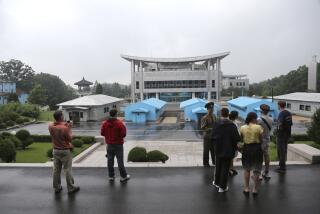The World : Cold War Redux: U.S. Travel Ban Against Cuba
WASHINGTON — What is there about Cuba that evokes such contradictory and often bizarre behavior from U.S. Administrations? Whatever it is, the Clin ton Administration has warded off its spell no better than its predecessors.
The Administration says, for example, that it wishes to reach out to the Cuban people, wishes to open the door to more contact with them. Yet, it continues to refuse to allow U.S. citizens to travel to Cuba to do just that, and it bases that refusal on a ridiculously obsolete statute: the Trading With the Enemy Act of 1917, a provision that can only be invoked in time of war or national emergency.
We aren’t at war, so where’s the national emergency? Well, believe it or not, it’s the emergency declared at the time of the Korean War, back in 1950.
When the Reagan Administration imposed currency controls in 1982--controls that effectively prevented the travel of most Americans to Cuba--it argued that the Cold War was a continuing emergency, of which the Korean War had been but the opening gun. Thus, under a grandfather clause, it insisted the controls were legal. The Supreme Court acquiesced to that argument in 1984, ruling by a narrow margin that because of the continuing struggle with the Soviet Union, national security needs had to override the rights of citizens to travel.
It was a strained argument even in 1984. But this is 1994. The Soviet Union has disintegrated. The Cold War is over. The national-security justification for travel controls has evaporated. Yet, the Clinton Administration has kept them on the books. The rights of U.S. citizens continue to be infringed and contacts with the Cuban people severely circumscribed.
The Administration maintains that controls are needed because the Cuban government isn’t democratic and violates human rights. Yes, but that doesn’t override the right of U.S. citizens to travel.
The Supreme Court didn’t uphold the controls in 1984 on any such grounds. Further, wouldn’t the assertions made of Cuba also be true of China, Saudi Arabia, Kuwait and a whole series of countries that we have friendly relations with? They aren’t democratic either, yet Americans travel freely there. Why not Cuba?
Perhaps the most compelling argument is that those in the front line of the struggle for a more open system and greater respect for human rights in Cuba, its religious leaders and its most prominent human-rights activists, oppose the controls. The Cuban Council of Catholic Bishops, the Ecumenical Council and activists such as Elizardo Sanchez, Francisco Chaviano, Yndamiro Restano and Osvaldo Paya, all call for open travel to Cuba. As they put it, the more U.S. citizens in the streets of Cuban cities, the better for the cause of a more open society. The Administration should listen. They are, after all, our natural allies.
These are the kinds of controls one expects of authoritarian governments but that ought to have no place in the U.S. system--certainly not today. More and more citizens will challenge them. The Administration can count on it.
One such group, led by the Freedom to Travel Campaign, has done just that. The Administration tried to avoid the issue and prevent them from traveling to Cuba by freezing their bank account. Supporters chipped in funds so that they could go anyway. Now the group is back and the Administration is in quandary as to how to handle them. It has three options:
First, it can play the heavy, press charges and take them to court. Except the Administration knows it would lose.
Second, it can pretend the visits never took place and take no action--thus evading the issue, but in the process making itself look foolish and virtually acknowledging that the controls have no validity. And no teeth.
Or, third, it can behave as a democratic government should, acknowledge that there is no longer any need for such measures and remove them. It can show vision and lead, or it can be forced ignominiously to discard something it shouldn’t have embraced in the first place. Which is it to be?*
More to Read
Sign up for Essential California
The most important California stories and recommendations in your inbox every morning.
You may occasionally receive promotional content from the Los Angeles Times.










